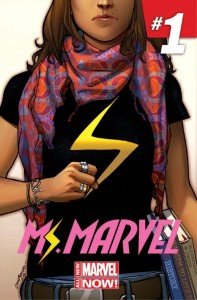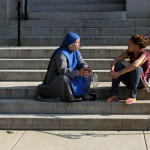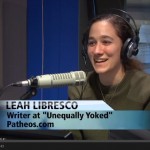Marvel Comics is introducing a new superheroine, Kamala Khan, who is a Muslim, and the New York Times teased out an interesting nuance of how the writers plan to cover her religion.
The creative team is braced for all possible reactions. “I do expect some negativity,” Ms. Amanat said, “not only from people who are anti-Muslim, but people who are Muslim and might want the character portrayed in a particular light.”
But “this is not evangelism,” Ms. Wilson said. “It was really important for me to portray Kamala as someone who is struggling with her faith.” The series, Ms. Wilson said, would deal with how familial and religious edicts mesh with super-heroics, which can require rules to be broken.
The writers of the series implicitly assume that showing a person struggling with their faith cannot be evangelism and that it’s somehow a little gauche or pushy to show someone supported and enmeshed by their faith. As to the first point, I do intend posts like Monday’s on my struggles with confession to be partially evangelistic. Hiding all the difficult parts of spiritual life can leave your interlocutor feeling more distant. Most people (reasonably enough) figure it can’t be all milk and honey this side of the grave, and wonder what you’re hiding.
Kamala Khan’s difficulties may make it easier for readers to understand her and for her faith to come alive for them, instead of remaining an abstract list of five pillars. When we fall in love with a character, we want to know them better, and may research their interests or ape their styles (theological or sartorial). Empathy may turn the comics into evangelism whether or not the writers mean to send that message.
When I read The Fountainhead in high school, it did change my life. After reading Ayn Rand’s prose, I wanted to be… an architect. I didn’t come out with strong feelings about moochers, but the beauty and deliberation of Roark’s designs had caught my attention in a way that physical buildings had not. I needed to be able to see through the eyes of an artist in text before I could look at buildings in that mindset. Rand would be disappointed to learn she had only motivated me to sign up for two months of after-school architecture classes and had had no effect on my politics. But this is the danger of making a vibrant character; the reader can fall in love with anything the character is passionate about.
I wonder if Kamala Khan’s authors plan to make her passionate about her faith. Will it turn up only when it is a source of tension? Writers can develop Khan’s beliefs through conflict with her family (the article mentions that her brother is conservative and her mother is worried about sexual purity). I’d like to see space for internal conflict that isn’t limited to religion versus the demands of the world, but invites the reader into the richness of a faith tradition.
I don’t know enough about Islam to make suggestions, but if they were writing for a Catholic heroine, the writers could have her worry about whether she could make vows as a Lay Dominican if her superpowered fights might keep her from ever having a schedule set enough to pray the Divine Office (which occurs spaced throughout the day). Or you could give us a sense of her character by showing us how she prays, not just a static scene of her on her knees before bed. Does she rely on set, ritual prayers like rosaries and chaplets, does she turn to kataphatic prayer, where she might imagine walking beside Christ during the events of the Gospels, or does she seek out apophatic prayer, emptying herself out before God in adoration by just repeating one phrase “Christ have mercy on me a sinner.”
Any of these choices help us to know our protagonist better, by showing us what she chooses within her spiritual life, instead of showing only one choice: religious or not. Internal conflict, especially conflict between several goods, can help us know and love a character, so we can understand her better when external conflict and plot move forward.
There’s no reason that Khan’s creators should set out to evangelize for Islam, but when they write her, I’d hope that they give enough of a window into her faith that they may stumble into evangelization by accident.













